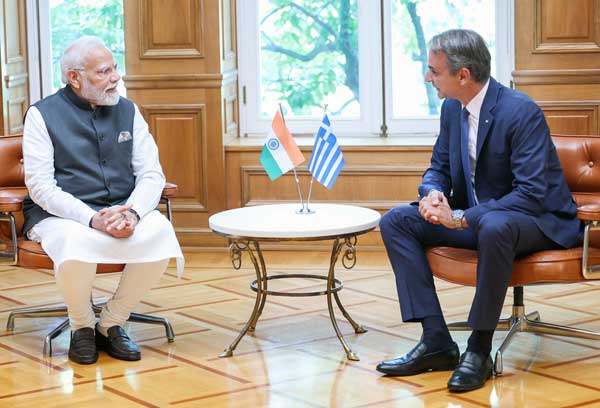Indian Prime Minister Narendra Modi paid a memorable visit to the Hellenic Republic at the invitation of his Prime Minister counterpart Kyriakos Mitsotakis on August 25, 2023. The visit helped elevate bilateral relations between the two countries to the level of a strategic partnership that includes vital areas of cooperation such as defense and security, infrastructure, agriculture, technology emerging economies, mobility and migration, maritime transport and skills development. among others.
Besides, PM Modi also focused on soft politics issues and players while addressing Indian diaspora, head of International Society for Krishna Consciousness (ISKCON) in Greece , Guru Dayanidhi Das, to the famous Greek researcher and musician Konstantinoes Kalaitzis, to academicians of the University of Athens and business leaders of Indian and Greek origin. The prime ministers of the two countries issued a joint statement at the end of the meeting, focusing on deeper collaboration and a reinvigorated approach to strengthening their seven-decade-old relationship.
Towards a broader partnership
The diplomatic opening towards Greece is indeed a step in the right direction, given that New Delhi has learned to understand and engage with Europe beyond Britain. The effort to engage in dialogue with a country on the Balkan Peninsula, particularly at the level of heads of state, is a diplomatic effort that took forty years to come to fruition. Greece, being located at the crossroads of Asia, Africa and Europe, assumes the status of a middle power and exercises the role of an intermediate regional power due to its geographical and political proximity to them.
While on a global level, it constitutes a gateway to Europe with its islands spread along the vast coastline of the Mediterranean Sea, thereby allowing it to control potential energy resources, thereby adding to its strategic location.
Analogously, India is the supreme power in the Indian Ocean Region (IOR) due to its extensive geography, skillful political orientation, population, economic foothold and military capabilities. This allows India to exert influence in the broader Indo-Pacific region which hosts more than a third of global bulk cargo traffic, two-thirds of global oil shipments and maritime lines of communication (SLOC).
In this regard, the ongoing Free Trade Agreement (FTA) negotiations between India and the European Union (EU) become more relevant and in line with the Prime Minister’s visit to Greece. Having a strategic partnership with a crucial EU member state will only generate better business for both parties, given that India will have better access to the huge European market, which coincides with the ambitions of the former to become a global manufacturing center supported by its strong Make in. Indian initiative (Atmanirbharta).
On the other hand, Greece will become a transit hub for Indian goods and services, boosting its logistics industry. As the EU aims to de-risk its supply chain outside of China, India can certainly provide a suitable and viable alternative.
The American Postman
The United States is a global power not only because it has the world’s largest economy, but also because its relationship with it is a decisive and consequential factor for countries engaging with each other. For example, India-US relations are witnessing an unprecedented improvement in their relationship, often defined as a global strategic partnership.
Synergies in defense cooperation, space exploration, critical and emerging technologies, artificial intelligence and growing people-to-people ties have only made their partnership stronger and more promising to resist the test of time. On the other hand, Greece is one of the United States’ closest allies and a key member of the U.S.-led collective defense agreement, the North Atlantic Treaty Organization ( NATO).
As India and Greece move closer to each other, their cordial relations with the United States only allow them to align in a more coherent direction by understanding and respecting policy objectives. foreign and national interests of each. India’s geography is indeed of great importance in the IOR, but its emphasis and strategic integration into the Indo-Pacific narrative is attributed to the White House diplomacy with which New Delhi ultimately agreed.
So, if Greece uses the Indo-Pacific lexicon and welcomes the Indo-Pacific Ocean Initiative (IPOI), then this is a calculated move that aims to accommodate the current geopolitical dynamics.
Conclusion
All things considered, there have been political and economic consultation meetings at the level of secretaries and ministers in recent years, but the meetings at the level of heads of state represent a renewed approach. In the joint statement, the two leaders highlight the values of democracy and respect for the rule of law as the driving force of their organic relationship. However, it becomes relevant to realize that in international politics, national interest triumphs over values and that a certain type of political system is simply put forward. not sufficient to ensure cooperation.
Athens and New Delhi supported each other in their respective positions on issues related to Cyprus and Kashmir (repeal of Article 370). Athens also backed New Delhi’s defense claims regarding its position on its refusal to sign the 1968 Nuclear Non-Proliferation Treaty and supported its admission to the 2008 Nuclear Suppliers Group.
Therefore, it is the respect for each other’s position in the international arena and the resulting cordial relations that have truly brought the two nations closer together and provided the necessary impetus to strengthen their bilateral relations.



